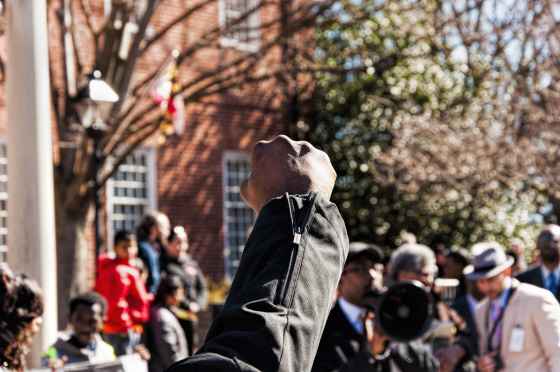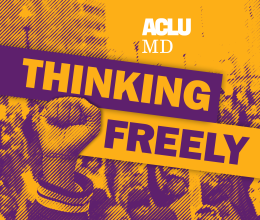Read the 2019 State Legislative Report
See our video updates from the 2019 Legislative Session
The ACLU of Maryland is a non-partisan organization dedicated to the preservation and enhancement of civil liberties and civil rights. In the legislature, we advocate for a broad range of rights including access to justice, criminal legal reform, education equity, election fairness, and voting rights, freedom of expression, government transparency, police accountability, prisoners’ rights, immigrants’ rights, equal protection, privacy, racial justice, due process, religious liberty, and LGBTQ and reproductive rights. The items below represent the issues we expect to dedicate significant time and resources to during the 2020 legislative session.
(Prioridades en todo el estado - En Español)
Click the headings below to access a downloadable fact sheet about each issue area.
Equity for Maryland’s School Children
The ACLU of Maryland works to ensure that all public school children in Maryland have an equitable opportunity to attend healthy and safe schools that provide high quality education. This session, we will work to secure equitable and adequate public school funding for all children; oppose discrimination in private schools that receive public funding; ensure that school facilities are conducive to learning; and advocate for positive school climate, including fair discipline policies.
(Igualdad para los niños de las escuelas de Maryland - En Español)
The Trust Act
Local law enforcement collaboration with ICE’s deportation machine has encouraged racial profiling against immigrant communities and fostered distrust for local police.
This fractured relationship between the community and law enforcement threatens public safety for everyone. We will renew our efforts to disentangle local law enforcement from the racist, inhumane, and misguided practices of federal immigration efforts.
(Ley de la Confianza - En Español)
Equality for Women Who Are Incarcerated
The number of women and girls in the criminal legal system has grown substantially over the past several decades. The over-incarceration of women devastates families, because 75% of women who are incarcerated are the primary or sole caretakers of children. Although women face similar challenges to men upon reentry, such as barriers to housing and employment, women also have different reentry needs. For instance, women are more than twice as likely to be incarcerated for a non-violent offense.
Currently, the Department of Public Safety and Correctional Services operates no dedicated lower-security facility for women preparing to return to the community from prison. However, DPSCS has nine facilities dedicated to preparing men who are returning to their communities around the state. The re-entry services available to women are inadequate as they are, but the situation is even more egregious in light of the services available to men.
(Las mujeres que salen del sistema de justicia legal merecen algo mejor - En Español)
Transparency in Policing
Under current law, if you file a complaint of police misconduct, you cannot find out how the department investigates your complaint. All you can find out is the outcome and the discipline. You cannot find out whether the department conducted a thorough or lackluster investigation of your complaint. This is because the complaint file is considered a ‘personnel record’ under Maryland’s Public Information Act and personnel records may never be disclosed. We will work to remove the complaint file from the personnel record category, thereby allowing (though not mandating) police departments to disclose the complaint file.
(Nuestras Comunidades Mercen Transparencia - En Epañol)
Expanding the Vote
Voting is the hallmark of our democracy. If an individual is eligible to vote, whether incarcerated or not, that right must be honored. In 2020, we will work with our partners to ensure that Marylanders who are incarcerated — which disproportionately affects Black and Brown people — who are eligible to vote, have meaningful access to the ballot. This includes voter registration applications, absentee ballot applications, and information about how to vote.
(Expansión del Voto - En Español)
Defending Children’s Right to Remain Silent
The number of children who are arrested have decreased in Maryland over the past 5 years. But there are still a great number of children who come into contact with law enforcement. Research shows that children are likely to feel especially pressured by the demands of authority figures, and their age affects how they act and respond. Children must have an attorney present during any questioning by law enforcement, so their due process rights are protected.
(Los niños tienen el derecho a permanecer callados - En Español)
Taking the Politics Out of Parole
Despite being sentenced to life with the possibility of parole, in practice, more than 2,000 Marylanders serving life sentences are condemned to die in prison. Unlike nearly every other state, Maryland requires the Governor to personally approve parole for anyone given a life with parole sentence. For more than two decades, these Marylanders have been systematically denied a meaningful opportunity for parole, regardless of individual merit and in spite of the Parole Commission recommending them for release after an extensive vetting process. Maryland must remove the Governor from this politicized parole process.
(Reforma de libertad condicional - En Español)
OTHER IMPORTANT CIVIL LIBERTIES ISSUES
In addition to the issues mentioned above, we expect to continue our work on the following:
- Access to Justice
- BOOST Funding
- Criminal Justice Reform
- Debtors’ Prisons
- Drug Policy Reform
- Fair Housing Practices
- Freedom of Expression
- Rights for People Who Are Incarcerated
- Privacy
- Reproductive Rights
- Transparency
- Election Fairness
- Workers’ Rights
- Youth Justice Reform



